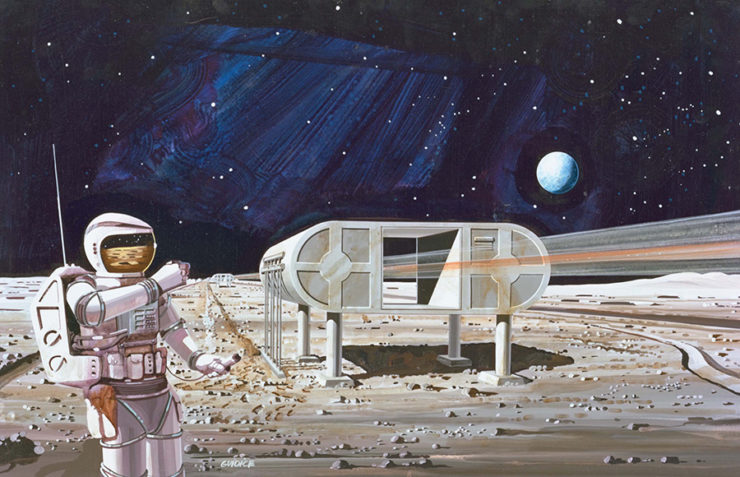Earlier this month, many of us were thrilled to learn that four astronauts had been selected for a mission to orbit Earth’s Moon, followed by the Artemis III Moon landing mission set to launch in late 2025. Although robot explorers have been sent to the Moon, humans last visited the Moon in 1972. That’s a hiatus that reminds me of the gap in visits to the South Pole, which went unvisited between 1912 and 1956.
However, just because humans were not visiting the Moon in actuality didn’t prevent SF authors from imagining what it might be like were humans to establish an enduring presence there. Indeed, the lack of actual Moon bases permitted imaginations to roam freely, as these five post-Apollo examples should make clear.
The Barbie Murders by John Varley (1978)
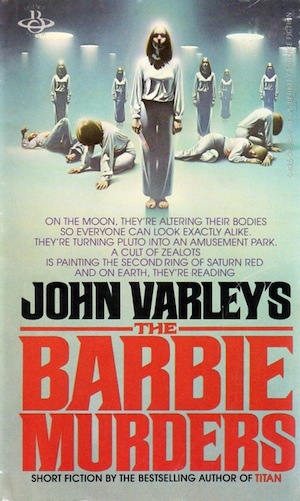
Humans brought their vices with them when they settled the Moon. As a lunar cop, Lieutenant Anna-Louise Bach’s job means investigating the same sorts of crimes she would face were she working in a Terrestrial city of a previous century, However, increasingly sophisticated technology introduces complications no 20th century investigator had to unravel. Take, for example, the Barbie Murders.
The Temple of the Standardized Church uses surgery to remove the genitals of devotees and transform them into identical copies, one virtually indistinguishable from the next. Uniformity comforts the faithful. When a serial killer begins targeting members of the church, uniformity complicates investigation. Bach is nothing if not determined, however, and will go to great lengths to arrest the guilty party.
This setting has advanced surgical technology which is able to reshape flesh at whim. It does not, however, appear to have anything like DNA testing, which would have simplified matters greatly. It does have offensive slang terms, an example of which would be calling the Temple’s member “Barbies,” a term unauthorized by the faithful and by the Mattel company…
On an unrelated note, the 1980 collection The Barbie Murders was later retitled Picnic on Nearside.
Growing Up Weightless by John M. Ford (1993)
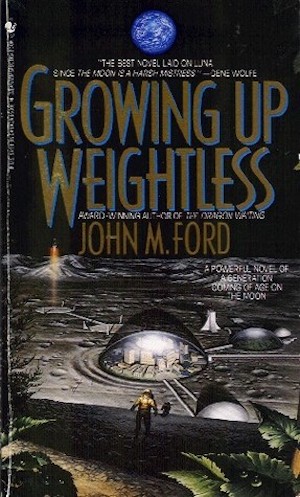
Teen Matt Roney lives on a developed Moon: a nation that won its independence decades ago, a world that is part of an interstellar trade network. Although Matt’s father might point out how limited lunar resources are, no Lunarian is homeless or hungry. This does not mean they are all happy.
Some teens might complain that everything of significance has been accomplished, that there is nothing left for them to do. Matt’s problem is exactly the opposite. Many alternatives present themselves. To choose one means rejecting all the others. How then can Matt be certain he will select the best alternative?
This being a John M. Ford novel, the author has lovingly worked out the intricate details of lunar infrastructure, then included in the novel only those details about which the characters would logically reflect. He trusted readers to fill in the blanks.
If you aren’t interested in blank-filling, Ford’s essay “To the Tsiolkovsky Station” provides more details. It can be found in the NESFA-published volume, From the End of the Twentieth Century.
The Next Continent by Issui Ogawa (2003) (Trans. Jim Hubbert 2010)
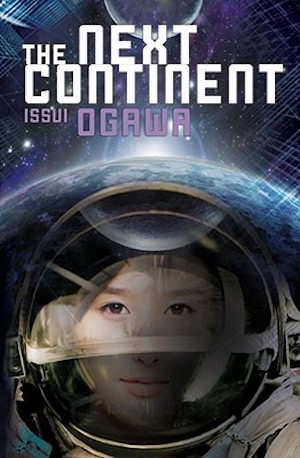
Tae Toenji believes she knows how to make lunar tourism pay where all previous efforts have failed. Her key insight: wealthy couples will pay exorbitant fees for lavish weddings. A lunar wedding facility could cater to the hyper-rich at hundreds of millions of yen per person! Since Tae is only thirteen, others will have to handle the heavy lifting of turning her vision into reality.
Tae’s grandfather Sennosuke Toenji, chairman of Eden Leisure Entertainment, contracts the task to Gotoba Engineering. Engineer Aomine Sohya is selected for a central role in the decade-plus projects, possessing as he does (or so his boss believes) an ideal combination of talent and expendability. Can Tae’s vision be made reality? People like Sohya will find out.
One of the things that jumped out at me on reading this was that many characters are well aware that the financial case for a lunar wedding chapel is tenuous, although they are careful to ensure the CFO is kept in the dark about that. Page later I discovered that the actual goal of the project is not the stated goal and since that true purpose is a spoiler, I will restrict myself to a simple “But surely, therapy would been more cost-effective?”
Moon You by Cho Seok (2018-)
In this ongoing webtoon, the world effort to save civilization was 10/11th successful. Only a small fraction of the approaching asteroid impacted on Earth. Of course, 1/11th of an apocalypse is still terrible. Resupply missions to the Moon colony will be affected, so it is decided that all the lunar staff will return to Earth before the impact.
One staff member, Moon Yoo, is left behind. He is overlooked, which is understandable, because he is introverted, lacks friends, and is so retiring as to be unmemorable.
Yoo is trapped up on the Moon. He briefly considers ending it all but discovers that available methods either do not work or scare him. Of course, he need not die immediately. The lunar facility is automated and filled with more supplies than Yoo can consume in decades. Yoo settles into a life of boredom and melancholy.
Unbeknownst to Yoo, his travails are intermittently transmitted to a recovering Earth. For the people of Earth, the fragmentary messages paint an inspirational picture of a heroic figure struggling to survive on the hostile Moon. That’s not how it seems to him.
This webtoon has a certain melancholy charm, like the manga Girls’ Last Tour.
The Relentless Moon by Mary Robinette Kowal (2020)
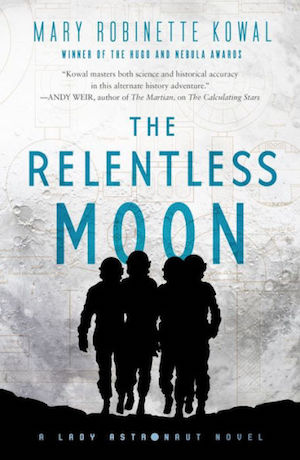
A meteor impact has devastated much of the Earth and catastrophically affected the climate. Runaway greenhouse effects will turn the planet into a new Venus. Very luckily for humanity (and such species as we might see fit to preserve), the process is slow enough that a concerted effort might establish a self-sustaining community on Mars before life on Earth becomes untenable.
A functioning Moon colony is key to successful Mars colonization. Protagonist Nicole Wargin is a key player, both in her own right as one of the Lady Astronauts that give this series its title (this is the third book) and also because of her influence on her highly-placed, ambitious politician husband. When sabotage threatens the lunar space program, Nicole gets to develop a whole new skill set: counter-espionage.
Who would sabotage the colonization effort? Not all of Earth’s remaining human inhabitants are on board with the efforts to colonize Mars. Many groups suspect (with good reason) that they will deemed surplus to requirements and left behind. “Saving some is better than none” is probably a lot more convincing to people who think they will be part of the rescued remnant than those who are convinced that they will be left behind to die.
***
There are, of course, many post-Apollo Moon base stories I could have used but didn’t (Bova’s Millennium, for example, or Rusch’s The Disappeared, for another). If I missed one of your favourites, feel free to mention them in comments below.
In the words of fanfiction author Musty181, four-time Hugo finalist, prolific book reviewer, and perennial Darwin Award nominee James Davis Nicoll “looks like a default mii with glasses.” His work has appeared in Interzone, Publishers Weekly and Romantic Times as well as on his own websites, James Nicoll Reviews (where he is assisted by editor Karen Lofstrom and web person Adrienne L. Travis) and the 2021 and 2022 Aurora Award finalist Young People Read Old SFF (where he is assisted by web person Adrienne L. Travis). His Patreon can be found here.










